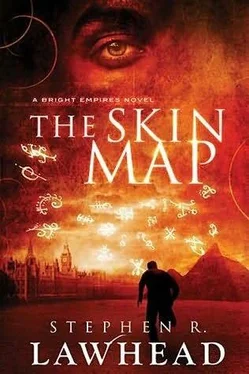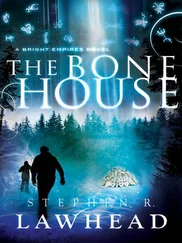Stephen Lawhead - The Skin Map
Здесь есть возможность читать онлайн «Stephen Lawhead - The Skin Map» весь текст электронной книги совершенно бесплатно (целиком полную версию без сокращений). В некоторых случаях можно слушать аудио, скачать через торрент в формате fb2 и присутствует краткое содержание. Жанр: Фэнтези, на английском языке. Описание произведения, (предисловие) а так же отзывы посетителей доступны на портале библиотеки ЛибКат.
- Название:The Skin Map
- Автор:
- Жанр:
- Год:неизвестен
- ISBN:нет данных
- Рейтинг книги:4 / 5. Голосов: 1
-
Избранное:Добавить в избранное
- Отзывы:
-
Ваша оценка:
- 80
- 1
- 2
- 3
- 4
- 5
The Skin Map: краткое содержание, описание и аннотация
Предлагаем к чтению аннотацию, описание, краткое содержание или предисловие (зависит от того, что написал сам автор книги «The Skin Map»). Если вы не нашли необходимую информацию о книге — напишите в комментариях, мы постараемся отыскать её.
The Skin Map — читать онлайн бесплатно полную книгу (весь текст) целиком
Ниже представлен текст книги, разбитый по страницам. Система сохранения места последней прочитанной страницы, позволяет с удобством читать онлайн бесплатно книгу «The Skin Map», без необходимости каждый раз заново искать на чём Вы остановились. Поставьте закладку, и сможете в любой момент перейти на страницу, на которой закончили чтение.
Интервал:
Закладка:
She put her head back and wailed, opening her soul to the sky, broadcasting her terror to the four winds. She screamed and kept on screaming until black spots danced before her eyes, and then she screamed again-loud, ragged, ugly bursts that rent the air and made her red in the face. When she could scream no more, she clenched her fists and stamped her feet, her boots splashing up mud from the trackway until, forces spent at last, she crumpled, subsiding into whimpers and moans, shedding tears for her fractured world.
Some part of her mind maintained a stubborn detachment, refusing to yield to the madness. Eventually, this practical awareness asserted itself, saying in effect: Get a grip, girl. You’ve had a nasty shock. Okay. So, what are you going to do about it? Sit all day in the mud and throw a tantrum like a two-year-old? It’s cold out here; you’ll freeze to death. Drag your wits together, and take charge!
Shaking water from her hands, she got to her knees and, placing a palm against her soggy bottom, looked around. Her quick survey confirmed that she was on a simple one-track lane in the midst of a bleak countryside of tended fields, and that she was very much alone. “Kit?” she called, but heard only the lonely call of a low-flying crow.
He’s toast, she thought, rising unsteadily to her feet. I’ll murder him in tiny little pieces. “Kit!” she shouted-and then it hit her: a rising wave of nausea that left her heaving in the middle of the trackway. She vomited once, then again, and felt better for it. Wiping her mouth on the sleeve of her jacket, she made her way toward a field marker she could see a few hundred yards along.
As she walked, she told herself that something very weird had happened and that whatever the explanation, it was all her loser boyfriend’s fault. The thought did not comfort her as much as she might have hoped, nor did imagining what she would do to him when she caught up with him again. The enormous strangeness of her undreamed-of situation at once dwarfed and engulfed all other concerns.
People did not go jumping from one place to another with nothing in between. It simply did not happen. She was sure Kit had been up to something, but she had never-not even for a nanosecond-imagined that he might have been telling some loopy version of the truth. And yet, here she was in the middle of nowhere-plucked off the teeming streets of overpopulated London and dropped in a lonely country lane-more or less as Kit had said. So this must be Cornwall. Or Devon.
She reached the marker stone and paused. There was nothing more to be seen except gently undulating hills-some wooded, some in grazing land-and ploughed fields stretching in every direction. She had no choice but to continue on until she reached a farmhouse or village where she could beg the use of a phone to call a taxi. Wrapping her arms around her, she plodded on and in a little while saw one of those old-fashioned wooden signposts with fingers pointing various directions. Her heart leapt at the sight. She picked up her pace and hurried on, soon to learn that the sign marked a significant road paved with square, hand-set stones.
She strode to the sign and paused to read it. The faded writing was in two languages, neither of which she recognized: Cornish, she decided, and something else. Gaelic, maybe? Or, were those two the same thing? In any case, the nearest place indicated on the greyed and weathered signpost was twelve something. Miles, probably. Or kilometres. She hoped it was kilometres.
Determined to put the unsettling strangeness of her predicament behind her and find the nearest human habitation, she stepped onto the road and began walking with purpose. After perhaps two or three miles or whatever-they-were, she heard a sound behind her-a slow, steady creak-clack-creak-clack. Turning around, she saw a horse-drawn wagon trundling along the road towards her. Obviously, a farmer, Mina thought. She hurried to meet the wagon, intent on hitching a ride to wherever he was going.
As the vehicle drew nearer, she realised that it was not, as she had first imagined, a simple field conveyance, but a much more substantial vehicle: a large, high-sided affair with a cloth top drawn over curved hoops to form a round tentlike covering. The wagon was pulled by not one but two rangy, long-eared mules, and sitting on the driver’s bench was a very plump man in a baggy cloth hat. She stopped and allowed the vehicle to meet her, whereupon it slowed and rolled to a halt.
“Hiya!” she called, putting on a chirpy voice in the fledgling hope that her damp and bedraggled appearance might be overlooked.
“Guten Tag,” came the reply, which sent Wilhelmina instantly back to her childhood and her German grandmother’s kitchen.
The unexpected oddity of encountering a Deutschsprachigen on the road only served to deepen her already fathomless confusion. Bereft of speech, she could only stare at the man.
Thinking, perhaps, that she had not understood, the stranger smiled and repeated his greeting.
“Guten Tag,” Mina replied. Grasping for her long-disused German, she said, “Ich freue mich, Sie kennen zu lernen.” The words felt lumpy and wooden in her mouth, and her tongue resisted making them. “Sprechen Sie Englisch?”
“Es tut mir Leid, Fraulein. Nein,” answered the man. He eyed her curiously, taking in her odd clothes and short hair, then squirmed in his seat and searched both ways down the road. “Sind Sie alleine hier?”
It took her a moment, but the words came winging back to her as if from a very great distance. He’s asking if I am alone out here, she thought. “Ja,” she answered. “Alleine.”
The fat man nodded, then spouted a longish sentence that again sent Wilhelmina right back to the German she had learned as a child-the long-outdated language of her grandmother, who had learned it from her immigrant grandmother, and much different from the Hochdeutsch Mina had studied in school. Nevertheless, she worked it out that he was offering her a ride to the next town. She accepted on the spot. The traveller put down the reins and stood, leaned over, and indicated the iron step ring projecting from the base of the wagon bed behind the front wheel, then reached down his hand. She placed a muddy boot on the step and accepted the offered hand, and was pulled effortlessly up and onto the wooden seat. As soon as she had settled on the bench, the man picked up the reins and gave them a snap. “Hu! ” he called; the wagon gave a jolt, the wheels creaked, and the mules resumed their languid clip-clop pace.
They proceeded in silence, rocking over the uneven road. Now and then, she stole a glance at the driver of the wagon. Her companion was a well-upholstered man of indeterminate age, with a mild, pleasant demeanour. His clothes were clean and tidy, but so very basic as to be nondescript-consisting of a plain wool jacket of dark green over a rough but clean linen shirt and spacious breeches of heavy dark hopsacking. His shoes were sturdy ankle-high boots, well crafted, but scuffed and worn and badly in need of a shine. The plump fellow presented an altogether unremarkable appearance-save for his face: smooth, pink as a baby’s, round, even-featured, with pale blue eyes beneath pale eyebrows, and ample cheeks that glowed in the brisk autumn breeze beneath the fine haze of a thin, stubbly blond beard.
It was that sweet-natured face that made him, she decided, for the countenance with which he faced the world wore an expression of benign cheerfulness-as if all that met his gaze amused and delighted, as if the world and everything in it existed only for his pleasure. He seemed to exude goodwill.
Finally, Wilhelmina cleared her throat and said, “Ich spreche ein biss-chen Deutsch, ja?”
The man looked at her and smiled. “Sehr gut, Fraulein.”
Читать дальшеИнтервал:
Закладка:
Похожие книги на «The Skin Map»
Представляем Вашему вниманию похожие книги на «The Skin Map» списком для выбора. Мы отобрали схожую по названию и смыслу литературу в надежде предоставить читателям больше вариантов отыскать новые, интересные, ещё непрочитанные произведения.
Обсуждение, отзывы о книге «The Skin Map» и просто собственные мнения читателей. Оставьте ваши комментарии, напишите, что Вы думаете о произведении, его смысле или главных героях. Укажите что конкретно понравилось, а что нет, и почему Вы так считаете.





